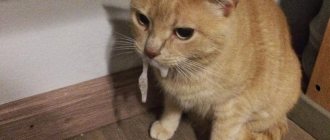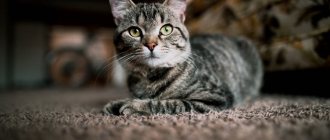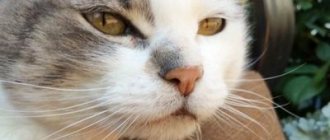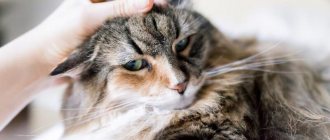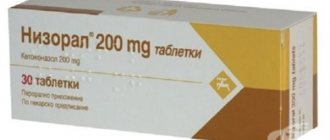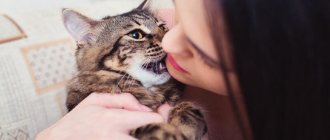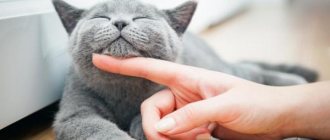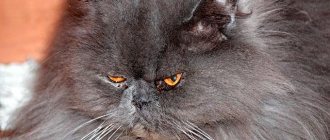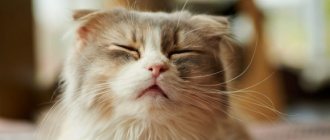Cats normally produce saliva in small doses. Excessive salivation occurs before eating, during feeding, changing teeth, from bitter medicines, and when it is necessary to lick the fur. It’s normal if the fur around the mouth is slightly damp; you need to worry if the moisture saturates the entire face and drips onto the floor. A cat's dripping drool is a sign of many conditions at once, and it is necessary to find out what happened as quickly as possible.
Why do cats drool from their mouths?
Cats themselves are very clean, so they have the habit of licking themselves, that is, cleaning themselves. In addition, they do not really like water, so many owners, in order not to injure the pet and it does not go outside, do not consider it necessary to bathe it. Bathing more than once a month can be harmful to the animal's hair, as it washes away the protective lipid layer.
That is why frequent licking is useful for a cat, it concerns cleanliness, but can provoke intestinal volvulus and various blockages in the organs of the digestive and respiratory systems. Often cats suffer from the fact that they have a gag reflex in order to remove lumps from the esophagus in a piece of fur that cause intestinal obstruction.
Why do cats drool from their mouths?
- Adeno- or enterovirus diseases. The cat may get sick, catch a cold or catch the intestinal flu. It is possible that an increased amount of secretion may be released. This is due to irritation, damage to the throat, root of the tongue, tonsils, as a result of which an increased amount of secretion is released. The body seems to be trying to get rid of pathogenic microorganisms with the help of mucus and copious amounts of fluid.
- Intestinal disorders. With dysbacteriosis, or gastritis, an ulcer produces an increased amount of secretion.
- Often saliva drips from the mouth when the thyroid gland is malfunctioning. Indeed, with insufficient or excessive secretion of thyroid hormones, sweating increases, there are problems with hair, and drooling also increases.
Salivation
The cat is drooling from his mouth: reasons
What is considered normal? In general, normally, the owner should not pay any attention to the secretion of the pet; it should be invisible. If there is a wet chest, everything near the muzzle is also wet, the secretion drips onto the tummy, the cat constantly wipes itself on the furniture, the whole bed is also wet, that is a reason for concern. Out of the blue, there should not be copious secretion. This is a sign of an existing pathology. Below we will look at the most common of them.
The cat is drooling from his mouth, reasons:
- Worms. With helminthic infestation, an increase in secretion is actually observed. This especially happens if the cat does not have intestinal worms, but lung worms. There may be a cough and increased secretion.
- Poisoning . Of course, domestic cats eat the food provided by the owner. Accordingly, the likelihood of poisoning is reduced to a minimum. However, cats themselves are very curious, so they may inadvertently try homemade chemicals or lick off a dangerous liquid. Because of this, poisoning may occur. Along with a huge concentration of saliva, vomiting, nausea, bowel dysfunction, and diarrhea are also observed. When infected with adenoviruses, snot is produced, as well as a severe cough.
cat
Caustic poisons
Cats cannot metabolize chemicals and medications well. This is due to their altered metabolism in the liver, called glucuronidation.
Corrosion from chemicals (washing detergents, floor cleaners, weed killers, etc.) can cause burns to the mouth, tongue, esophagus and stomach. If swallowed, they can cause poisoning and severe drooling.
If you suspect that your cat has recently been exposed to a caustic chemical, you should rinse her mouth with water. After rinsing, offer your cat something she will enjoy drinking, such as chicken broth. This will flush the esophagus and loosen the toxin in the mouth.
Why is the cat drooling and sticking out its tongue?
Similar symptoms appear with serious illnesses and pathologies present in the cat. A protruding tongue is a sign of choking and the presence of a hairball in the throat or esophagus. The cat may wheeze and breathe heavily.
The cat is drooling and sticking out his tongue:
- Diabetes. The functioning of the entire body is disrupted, so there may be increased sweating, excessive secretion of sebum, which is why the hair looks like icicles, and increased secretion production.
- Oncological diseases. It could be cancer of the throat or esophagus. The cat can drink a lot of liquid to try to push the foreign object in the digestive and respiratory system, but this cannot be done.
- The main reason is the presence of foreign objects in the esophagus. That is, a cat can swallow a hairball, which is why there is a cough and increased secretion. The cat is trying to get back what he ate.
- Another common cause of drooling in cats is rabies. This is a dangerous disease with clear symptoms. The cat can be very restless. The disease should be suspected in case of contact with sick pets. If not, then there is nothing to worry about.
Salivation
The cat is drooling and has bad breath
If, along with copious secretion, a cat has a rotten breath, this is due to the problem of changing baby teeth. Please note that if the gums are red and inflamed, it makes sense to go to the vet.
The cat is drooling and has bad breath:
- Baby teeth may not always fall out on their own, so they need to be removed to make life easier for the cat. Excessive secretion of saliva and an unpleasant odor may be associated with the consumption of hard, dry food, which is not suitable in its hardness and consistency for the cat.
- Cats are predators, so pieces of food can get stuck between their teeth and begin to rot. Along with this, there is a huge secretion, inflammation of the gums and bad breath. With a constant flow of secretion, you should definitely look at the condition of your gums and teeth.
- If the cat is lethargic, constantly sleeps, and eats poorly, then it has problems with its teeth and gastrointestinal tract. Eating is associated with pain. Other troubles should not be ruled out.
- Normally, a small amount of secretion should be released. If the bed is not wet and the cat does not rub its face to remove excess moisture, then everything is fine. Increased salivation can be observed due to the unconditioned reflex. That is, before eating, or under stress. Therefore, if you are going to give the animal a pill, or have taken it to the veterinarian for a haircut, then there is nothing wrong with increased secretion, the pet is so nervous.
Treatment
Respiratory diseases
Viral respiratory diseases can lead to ulcerations in your cat's mouth. This may cause mouth pain and increased salivation. Cats that live in shelters or multi-cat homes have a higher risk of respiratory infections.
The veterinarian must treat infections. However, you can take steps to prevent your cat from becoming infected. Some of these include keeping your cat indoors, ensuring up-to-date vaccinations, limiting interactions with other pets, and washing your hands after handling other animals.
If your cat is drooling, what should you do?
You should not start self-medication until a diagnosis has been made.
If your cat is drooling, what to do:
- Cats have a very delicate sense of smell, so they rarely get poisoned by eating expired, spoiled or unsuitable food. However, it is precisely because of their keen sense of smell that cats can become poisoned by household chemicals. When using chemical solutions, the main mistake is to try to rinse the animal's stomach. If you induce vomiting in an animal by pressing on the root of the tongue, thereby trying to return the contents back, you will additionally injure the food passages and stomach.
- The chances of recovery are significantly reduced. That is why we recommend giving your animal several tablets of activated carbon. If it is not there, Enterosgel or Smecta will do. Feed the animal with these sorbents, they will absorb all toxic substances, absorbing them and turning them into safe chemical compounds that will leave the body along with feces and urine.
- Owners of cats with long hair have noticed that these animals more often than others suffer from blockage of the food passages with hair. That is why we advise such animals to introduce more fiber, green grass into their diet, or purchase special supplements and food. They were created for long-haired breeds not by chance, and differ significantly in their composition. Made with the addition of fiber, which helps remove hair particles from the body along with feces. The risk of intestinal blockage by wool is minimized, which means that there will be much less saliva released when the intestines or esophagus are blocked by wool.
- Before eating, secretion is completely normal. It can stand out if the housewife is in the kitchen and uses the animal’s favorite product for cooking. This is also a reflex reaction of the body.
- In case of intestinal diseases, it is necessary to normalize the microflora of the digestive organs, and in case of colds, cure them. Of course, take care of your dental health.
- In any case, if you come into contact with other cats and then an increased amount of saliva appears, you should get tested for rabies and observe the animal’s behavior.
cat
In what cases does an animal require treatment?
Treatment is required for any pathological cause, since self-healing is an extremely rare phenomenon. To determine the necessary medications, the pet will have to undergo tests and undergo all examinations recommended by the doctor.
Do not delay contacting the veterinary clinic if alarming symptoms are detected. Timely treatment begins significantly reduces the risk of developing possible complications.
Why does a cat drool when you pet him?
Please note that for some breeds, excessive salivation is normal. These are short-haired breeds, such as Sphynxes. These animals may secrete an increased amount of secretion during affection, that is, when the owner strokes them. This is considered a variant of the norm.
The cat drools when you pet him:
- If you recently gave your animal a new drug for helminths, then increased secretion is a reaction to taking the medication. The fact is that some of the anthelmintic drugs can reduce the sensitivity of taste buds, and accordingly the animal will have profuse salivation.
- Very often in the summer, insects are the cause of a large amount of saliva in cats. Cats are very playful and inquisitive, so they won’t let a spider or some kind of bug pass by. Some insects carry special toxic substances on their legs, which help them defend themselves in their environment and nature.
- This is a kind of protection of small insects from birds and larger animals that eat insects. Therefore, if a cat ate a spider, toxic substances can cause an allergic reaction, irritating nerve receptors.
Drooling
For cat lovers, our website has a lot of useful information:
The cat wants a cat, what to do, how to calm it down? How long does a cat want a cat?
Is it possible to give cats human tablets, No-shpu, Valerian tablets? How to give a bitter pill to a cat without spitting it out?
Why does a cat itch and lick itself, but there are no fleas? The cat is constantly itching: causes, methods of treatment
After an animal has eaten a spider, profuse salivation can be observed for 24 hours. If you see that the animal is restless, or, on the contrary, lethargic, does not eat anything, has diarrhea and drooling for more than a day and a half, consult a doctor immediately.
Adviсe
Here are a few tips that you need to know and, if possible, follow if you want to return your pet's saliva production to normal :
- the very first thing is to hide all substances, drugs and preparations that are dangerous to its health in a place inaccessible to the cat;
- give more fluid so that the animal’s metabolism is activated and there is no dehydration;
- Products should be introduced into the cat’s diet gradually, starting only with liquid food;
- In order not to aggravate the situation and avoid its recurrence, carefully monitor what you feed your cat: you should not give it bony fish or food that may contain small hard pieces;
- if there is any damage to the oral cavity, it must be promptly treated with disinfectants;
- When treating your pet's fur for fleas and ticks, put a bandage on the cat's neck to prevent the cat from licking the preparation from the fur.
If salivation decreases, the amount of saliva gradually returns to normal, then all the doctor’s recommendations are being followed, and your pet is on the mend.
![Why is the cat drooling: [Find out the reason, What to do]](https://koriiza.ru/wp-content/uploads/pochemu-u-kota-tekut-slyuni-uznajte-prichinu-chto-delat-330x140.jpg)
